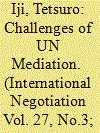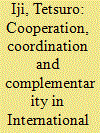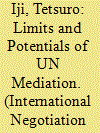| Srl | Item |
| 1 |
ID:
187038


|
|
|
|
|
| Summary/Abstract |
This is the second of a two-part special issue of International Negotiation devoted to examining mediation conducted by the United Nations. The articles contribute to our understanding of the UN as an international mediator, notably its relevance and efficacy, and the challenges and opportunities it faces. Now, past its 75th anniversary, the UN can and still does mediate in the evolving international environment, showing a mixed track record of limitations and achievements in a variety of peacemaking engagements.
|
|
|
|
|
|
|
|
|
|
|
|
|
|
|
|
| 2 |
ID:
108886


|
|
|
|
|
| Publication |
2011.
|
| Summary/Abstract |
The United States and four other major Western states pursued "Contact Group" diplomacy in trying to resolve the conflict in Namibia from 1977 to 1982-1983. This analysis examines their joint mediation, paying particular attention to the efficacy and constraints of the four principal mediating strategies. First, to mediate collectively helped the Western states in terms of credibility and influence as well as burden sharing and innovation, but it posed the problems of intragroup co-ordination and division. Second, working through the United Nations made the Contact Group a legitimate and credible mediator, whilst the organisation's decolonisation agenda called the mediator's neutrality into question. Third, the Western states managed to enhance their leverage by compounding within the group or borrowing from outside although the extent of such enhancement was limited. Lastly, the Group's record on the carrot-and-stick strategy towards South Africa was also mixed, with a great impact on its performance.
|
|
|
|
|
|
|
|
|
|
|
|
|
|
|
|
| 3 |
ID:
061871


|
|
|
| 4 |
ID:
187039


|
|
|
|
|
| Summary/Abstract |
What can UN mediators do to bring warring parties to a negotiated settlement? This article – using ripeness theory – focuses on the parties’ incentives to make a policy shift from war to settlement, and mediators’ influence over such incentives. Mediators can influence through utilizing leverage to create incentives by affecting the parties’ perceived relative power, and through applying intangible resources to facilitate incentive creation without affecting perceived relative power. The constraint on UN mediators is their lack of leverage, while their potential lies in their unique repertoire of intangible resources for facilitative influence. A recurrent limitation of UN mediation manifests where state mediators’ manipulative influence is needed to create the parties’ incentives, and UN mediators’ facilitative influence alone is not enough. On the other hand, UN mediatory potential can be utilized where the parties’ incentives are developed through their own actions and often in the face of pressure and leverage from external patrons.
|
|
|
|
|
|
|
|
|
|
|
|
|
|
|
|
| 5 |
ID:
151677


|
|
|
|
|
| Summary/Abstract |
This article, in outlining the evolution of the UN's peacemaking and mediating roles from the immediate aftermath of the Cold War until well into the twenty-first century, seeks to examine challenges and opportunities and suggests possible niches for the organization's role in this field. The article argues that in the present polarized world, there may be more room for the UN in mediating conflicts less affected by the vital security interest of great powers in conflict, and it points to the challenge of competition and rivalry in relation to other candidates as mediators, such as regional organizations, nongovernmental organizations, and entrepreneurial state mediators. It posits that the UN's value as mediator will depend in large measure on its ability to demonstrate usefulness in today's crowded mediation environment.
|
|
|
|
|
|
|
|
|
|
|
|
|
|
|
|